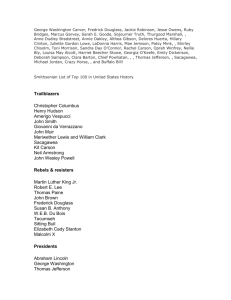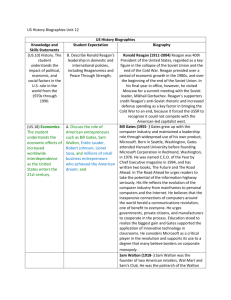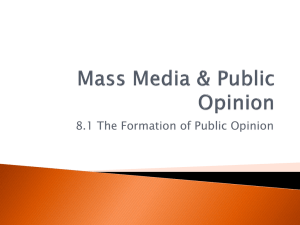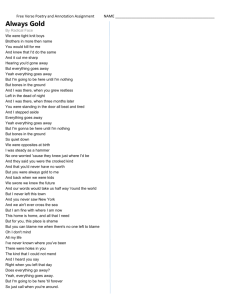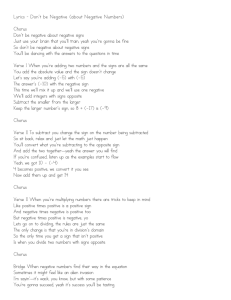Maria Bartiromo on Oprah: WINFREY: Well, you've
advertisement
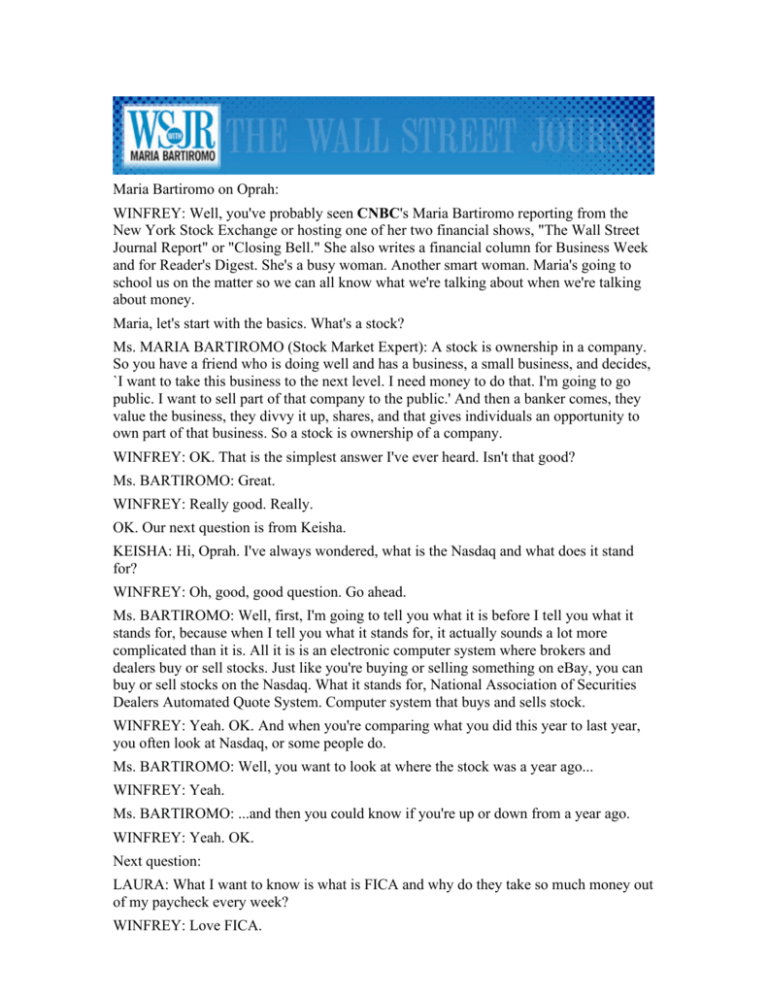
Maria Bartiromo on Oprah: WINFREY: Well, you've probably seen CNBC's Maria Bartiromo reporting from the New York Stock Exchange or hosting one of her two financial shows, "The Wall Street Journal Report" or "Closing Bell." She also writes a financial column for Business Week and for Reader's Digest. She's a busy woman. Another smart woman. Maria's going to school us on the matter so we can all know what we're talking about when we're talking about money. Maria, let's start with the basics. What's a stock? Ms. MARIA BARTIROMO (Stock Market Expert): A stock is ownership in a company. So you have a friend who is doing well and has a business, a small business, and decides, `I want to take this business to the next level. I need money to do that. I'm going to go public. I want to sell part of that company to the public.' And then a banker comes, they value the business, they divvy it up, shares, and that gives individuals an opportunity to own part of that business. So a stock is ownership of a company. WINFREY: OK. That is the simplest answer I've ever heard. Isn't that good? Ms. BARTIROMO: Great. WINFREY: Really good. Really. OK. Our next question is from Keisha. KEISHA: Hi, Oprah. I've always wondered, what is the Nasdaq and what does it stand for? WINFREY: Oh, good, good question. Go ahead. Ms. BARTIROMO: Well, first, I'm going to tell you what it is before I tell you what it stands for, because when I tell you what it stands for, it actually sounds a lot more complicated than it is. All it is is an electronic computer system where brokers and dealers buy or sell stocks. Just like you're buying or selling something on eBay, you can buy or sell stocks on the Nasdaq. What it stands for, National Association of Securities Dealers Automated Quote System. Computer system that buys and sells stock. WINFREY: Yeah. OK. And when you're comparing what you did this year to last year, you often look at Nasdaq, or some people do. Ms. BARTIROMO: Well, you want to look at where the stock was a year ago... WINFREY: Yeah. Ms. BARTIROMO: ...and then you could know if you're up or down from a year ago. WINFREY: Yeah. OK. Next question: LAURA: What I want to know is what is FICA and why do they take so much money out of my paycheck every week? WINFREY: Love FICA. Ms. BARTIROMO: Mr. FICA, Federal Insurance Contribution Act. Basically, a federal law that requires employees and employers to with--to hold back a portion of our paychecks, put it into a fund that when we turn 65, will pay our Medicare and all sorts of security benefits. So... WINFREY: We hope. Ms. BARTIROMO: We hope. WINFREY: Yeah. Ms. BARTIROMO: So every two weeks, you have to pay, as an employee, 7.65 percent of your check. Your employer will match that, another 7.65 percent of your check, for a total of 15.2 percent. Goes into a fund, and then when we return, that's where the Social Security money comes from, that's where the Medicare benefits come from. If you're selfemployed, you're on the hook for the whole 15.2 percent. WINFREY: That's true. So what happens then if you don't live to collect that? Ms. BARTIROMO: Good question. Your heirs may get that but there's a lot of paperwork involved. A lot of people question whether your heirs will actually get that money. It may or not be there. That's the debate. WINFREY: That is a debate. OK, audience, another question for you. Who here knows what the stock market really is? Yes, if you do, no, if you don't. What do you think the percentage is going to be? Ms. BARTIROMO: I'd say they know. WINFREY: OK. I would say. OK, let's see the results. OK, that's interesting. Forty-one percent say they do, 59 percent say no, they don't. OK. What's the easiest explanation you can give? Ms. BARTIROMO: You know what? It's a market of stocks, basically. It's companies that trade, giving individuals an opportunity to have ownership of companies. Think of a small business. They need to raise money, a small business needs to raise money. It offers individuals an opportunity to have a stake in that company. That stock will trade and it changes minute by minute. Stock market is open from 9:30 to 4, it could be at one price at 9:30, completely different price at 4:00 because it all depends on how much demand there is out there. So if there's a lot of people who want the stock, it's going to go up. WINFREY: Why are the guys on the floor yelling so much? Ms. BARTIROMO: Because information is moving so quickly and stocks are trading all day long. So let me give you a quick analogy. WINFREY: OK. Ms. BARTIROMO: Here at home, you call your broker and you say, `I want to buy a million shares of IBM.' WINFREY: Right. Ms. BARTIROMO: Your broker calls his representation on the floor. In other words, the broker standing on the floor. He goes over to the post where IBM is trading. If you want to buy a million shares of IBM, he's got to get somebody who'll sell it to you. He's got to run over to that post. Now, you said to your broker, `I want to buy IBM and I'm not paying one--one penny more than 470 a share.' He's got to get over to that post before that stock changes in price. WINFREY: OK. Ms. BARTIROMO: So he's got his million share order from Oprah... WINFREY: Yeah. Ms. BARTIROMO: ...and he says, `I'm going over to the IBM post, I'm going to buy this million shares. WINFREY: And he's physically running over there? Ms. BARTIROMO: He's physically running over because if somebody gets in front of you and they want to buy a million shares, and then somebody else wants to buy more shares... WINFREY: Then it's going up? Yes. Ms. BARTIROMO: ...that stock, next thing you know, it's 72. Then he's got to call you back and say... WINFREY: It's 71. Ms. BARTIROMO: ...`Guess what, Oprah? I couldn't buy it at 70. You're paying 75.' And you say, `You're fired.' They're yelling! WINFREY: You betcha. OK. That's why they're yelling. OK. When you buy stock, does the money actually change hands or is it just a numbers game on the Big Board? Ms. BARTIROMO: It's sort of a numbers game but at some point, you're going to have to send that check in if you want to buy that stock and you want to own that stock. You're sending the money for the person who's selling you the stock. WINFREY: Yeah. Ms. BARTIROMO: So yes, that day, you feel like it's a numbers game. But it will come home to roost. You've got to send the money in. WINFREY: You know, in the early, early days, when I first started making money, 'cause I grew up in the era and my father would say, `Put it in the shoe box. That's what you need to do.' And, or go to the bank and so forth. So when I first started it, you know, I was very--I was scared to diversify. And I always wanted to like go to all of the accounts that I had and say, `Let me see the money.' Yeah, `Show me the money.' I've gotten better. Warren Buffett, one of the top financial wizards in the world, has a strategy for becoming rich off of the stock market. What is it? Ms. BARTIROMO: His strategy is to buy well-known, quality companies. He calls them market leaders. The Coca-Colas of the world, American Express, those are two of his big holdings. He wants to buy quality companies at good prices. So if you want to buy a new sweater, you may love the sweater. Do you still love it at $120? Maybe not. He's only going to buy good companies at good prices. WINFREY: OK. We'll be right back. Coming up, when is the best time to buy a house or a car? Maria answers more burning questions when we come back. (Announcements) WINFREY: When is the best time to buy a house? Ms. BARTIROMO: Low interest rates. Right now, a lot of people feel that prices are overpriced across the country. WINFREY: They are, they are. Ms. BARTIROMO: Yeah. But--but interest rates are low. You want to buy a home when rates are low. But at the same time, I wouldn't say you want to time this market. A home is your home, it's an investment. You want to buy a home when you need a home and you want to live in a home and you find a beautiful home. Don't try to time the market as the best time to buy it, but you also want to be cognizant of the fact that are prices out of control and will they come down? At this point, probably. WINFREY: When is the best time of year to buy a car? Ms. BARTIROMO: Same thing, low interest rates. I mean, I don't think there's a best time, fall or you know, summer. But you want to definitely have low interest rates. WINFREY: Does money ever get thrown away by the banks because it's too old or too dirty? Ms. BARTIROMO: It does. WINFREY: What is the throw-out date? Ms. BARTIROMO: I don't--I don't know the throw-out date. WINFREY: I'm only kidding. People say, `Can I be there when they're'--I know all those people are like, `When is the day you all are throwing out your money?' Yeah. Oh, gosh, go ahead. I'm sorry. Ms. BARTIROMO: No. I--when it does get old and--and actually the quality has deteriorated, they do throw it out and they shred it, actually. In fact... WINFREY: Who makes that decision? Ms. BARTIROMO: The Federal Reserve banks of the state. WINFREY: OK. Ms. BARTIROMO: Like the Federal Reserve of--of New York will do it, you know, in New York, wherever it's held. WINFREY: OK. Ms. BARTIROMO: But if you go visit the Federal Reserve Bank of New York, for example, I actually took this tour recently. WINFREY: Yeah? Ms. BARTIROMO: They will give you bags and bags of shredded dollars. It's actually really cool. WINFREY: OK, good. Ms. BARTIROMO: It's a fun gift. WINFREY: It's a fun gift, yeah, yeah. Shredded money. What's the best way for a person to save the most money, do you think? Ms. BARTIROMO: I--I think there's three buckets of savings. Number one, a savings account, real simple stuff. Savings account or a CD. You're not going to get a great interest rate, it's a low rate, but at least you know it's there, it's safe. WINFREY: But don't you think you should start your kids off with a savings account, too? Ms. BARTIROMO: Absolutely. WINFREY: So that they get attuned to the idea of not spending everything they get? Ms. BARTIROMO: No doubt about it. WINFREY: Yeah. Ms. BARTIROMO: My mother started me off with a Christmas Club and I just love her to death for doing this. She--every January, would take her paycheck and a little portion of it, she would put in the Christmas Club, put it into the Christmas Club. And then by November, she would give me this grat check, and then I would buy all my Christmas presents with it and it really taught me this idea of saving. WINFREY: Yeah. Ms. BARTIROMO: So certainly, a savings, a CD, number one. I think that's the easiest and most liquid, sort of safe. Number two, you must have a 401(k). if your company is not offering a 401(k), you must have an IRA, individual retirement account, because I think you want to have something there when you retire. And number three, I do believe most people should be invested in stocks. So you want to have an investment account if you have the extra money to do so. So three buckets of savings. WINFREY: Yeah. OK. Biggest money mistakes you see people make? Ms. BARTIROMO: I go out to dinner way too much. I--I spend too much money on dinner. I'll order in and I'll buy my Starbucks. It depends. I think eating out, I think, you know, that knee-jerk reaction, gifts that we want to get ourselves, those fabulous shoes that cost way too much. But I don't know, for me, it's eating out. WINFREY: Eating out? OK. Thank you so much. Ms. BARTIROMO: Thank you. WINFREY: Wonderful watching you on CNBC. CNBC, Maria Bartiromo. We'll be right back.
